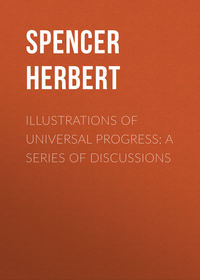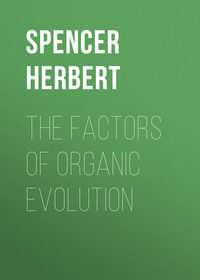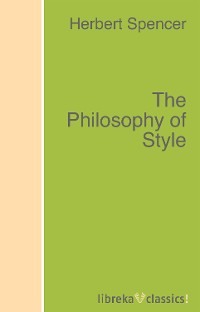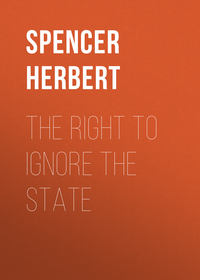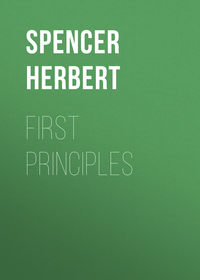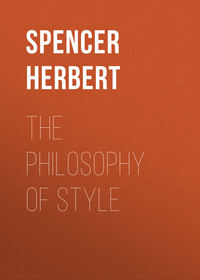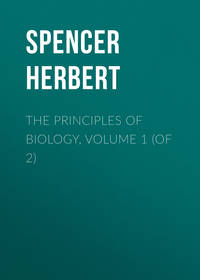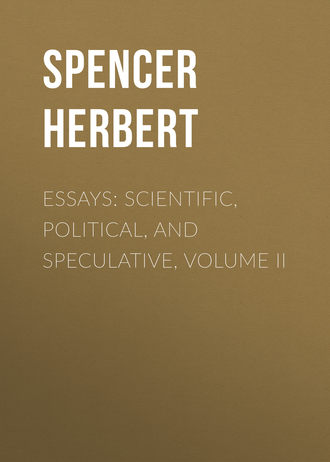 полная версия
полная версияEssays: Scientific, Political, and Speculative, Volume II
To the positive justification of a proposition, may be added that negative justification which is derived from the untenability of the counter-proposition. When describing the attitude of pure Empiricism, some indications that its counter-proposition is untenable were given; but it will be well here to state, more specifically, the fundamental objections to which it is open.
If the ultimate test of truth is not that here alleged, then what is the ultimate test of truth? And if there is no ultimate test of truth, then what is the warrant for accepting certain propositions and rejecting others? An opponent who denies the validity of this test, may legitimately decline to furnish any test himself, so long as he does not affirm any thing to be true; but if he affirms some things to be true and others to be not true, his warrant for doing so may fairly be demanded. Let us glance at the possible response to the demand. If asked why he holds it to be unquestionably true that two quantities which differ in unequal degrees from a third quantity are themselves unequal, two replies seem open to him: he may say that this is an ultimate fact of consciousness, or that it is an induction from personal experiences. The reply that it is an ultimate fact of consciousness, raises the question, How is an ultimate fact of consciousness distinguished? All beliefs, all conclusions, all imaginations even, are facts of consciousness; and if some are to be accepted as beyond question because ultimate, while others are not to be accepted as beyond question because not ultimate, there comes the inevitable inquiry respecting the test of ultimacy. On the other hand, the reply that this truth is known only by induction from personal experiences, suggests the query – On what warrant are personal experiences asserted? The testimony of experience is given only through memory; and its worth depends wholly on the trustworthiness of memory. Is it, then, that the trustworthiness of memory is less open to doubt than the immediate consciousness that two quantities must be unequal if they differ from a third quantity in unequal degrees? This can scarcely be alleged. Memory is notoriously uncertain. We sometimes suppose ourselves to have said things which it turns out we did not say; and we often forget seeing things which it is proved we did see. We speak of many passages of our lives as seeming like dreams; and can vaguely imagine the whole past to be an illusion. We can go much further toward conceiving that our recollections do not answer to any actualities, than we can go toward conceiving the non-existence of Space. But even supposing the deliverances of memory to be above criticism, the most that can be said for the experiences to which memory testifies, is that we are obliged to think we have had them – cannot conceive the negation of the proposition that we have had them; and to say this is to assign the warrant which is repudiated.
A further counter-criticism may be made. Throughout the argument of pure Empiricism, it is tacitly assumed that there may be a Philosophy in which nothing is asserted but what is proved. It proposes to admit into the coherent fabric of its conclusions, no conclusion that is incapable of being established by evidence; and it thus takes for granted that not only may all derivative truths be proved, but also that proof may be given of the truths from which they are derived, down to the very deepest. The result of thus refusing to recognize some fundamental unproved truth, is simply to leave its fabric of conclusions without a base. The giving proof of any special proposition, is the assimilation of it to some class of propositions known to be true. If any doubt arises respecting the general proposition which is cited in justification of this special proposition, the course is to show that this general proposition is deducible from a proposition or propositions of still greater generality; and if pressed for proof of each such still more general proposition, the only resource is to repeat the process. Is this process endless? If so, nothing can be proved – the whole series of propositions depends on some unassignable proposition. Has the process an end? If so, there must eventually be reached a widest proposition – one which cannot be justified by showing that it is included by any wider – one which cannot be proved. Or to put the argument otherwise: Every inference depends on premises; every premise, if it admits of proof, depends on other premises; and if the proof of the proof be continually demanded, it must either end in an unproved premise, or in the acknowledgment that there cannot be reached any premise on which the entire series of proofs depends. Hence Philosophy, if it does not avowedly stand on some datum underlying reason, must acknowledge that it has nothing on which to stand.
The expression of divergence from Mr. Mill on this fundamental question, I have undertaken with reluctance, only on finding it needful, both on personal and on general grounds, that his statements and arguments should be met. For two reasons, especially, I regret having thus to contend against the doctrine of one whose agreement I should value more than that of any other thinker. In the first place, the difference is, I believe, superficial rather than substantial; for it is in the interests of the Experience-Hypothesis that Mr. Mill opposes the alleged criterion of truth; while it is as harmonizing with the Experience-Hypothesis, and reconciling it with all the facts, that I defend this criterion. In the second place, this lengthened exposition of a single point of difference, unaccompanied by an exposition of the numerous points of concurrence, unavoidably produces an appearance of dissent very far greater than that which exists. Mr. Mill, however, whose unswerving allegiance to truth is on all occasions so conspicuously displayed, will fully recognize the justification for this utterance of disagreement on a matter of such profound importance, philosophically considered; and will not require any apology for the entire freedom with which I have criticised his views while seeking to substantiate my own.
REPLIES TO CRITICISMS
When made by a competent reader, an objection usually implies one of two things. Either the statement to which he demurs is wholly or partially untrue; or, if true, it is presented in such a way as to permit misapprehension. A need for some change or addition is in any case shown.
Not recognizing the errors alleged, but thinking rather that misapprehensions cause the dissent of those who have attacked the metaphysico-theological doctrines held by me, I propose here to meet, by explanations and arguments, the chief objections urged: partly with the view of justifying these doctrines, and partly with the view of guarding against the wrong interpretations which it appears are apt to be made.
The pages of a periodical intended for general reading may be thought scarcely fitted for the treatment of these highly abstract questions. There is now, however, so considerable a class interested in them, and they are so deeply involved with the great changes of opinion in progress, that I have ventured to hope for readers outside the circle of those who occupy themselves with philosophy.
Of course the criticisms to be noticed I have selected, either because of their intrinsic force, or because they come from men whose positions or reputations give them weight. To meet more than a few of my opponents is out of the question.
Let me begin with a criticism contained in the sermon preached by the Rev. Principal Caird before the British Association, on the occasion of its meeting in Edinburgh, in August, 1871. Expressed with a courtesy which, happily, is now less rare than of yore in theological controversy, Dr. Caird’s objection might, I think, be admitted without involving essential change in the conclusion demurred to; while it might be shown to tell with greater force against the conclusions of thinkers classed as orthodox, Sir W. Hamilton and Dean Mansel, than against my own. Describing this as set forth by me, Dr. Caird says: —
“His thesis is that the provinces of science and religion are distinguished from each other as the known from the unknown and unknowable. This thesis is maintained mainly on a critical examination of the nature of human intelligence, in which the writer adopts and carries to its extreme logical results the doctrine of the relativity of human knowledge which, propounded by Kant, has been reproduced with special application to theology by a famous school of philosophers in this country. From the very nature of human intelligence, it is attempted to be shown that it can only know what is finite and relative, and that therefore the absolute and infinite the human mind is, by an inherent and insuperable disability, debarred from knowing… May it not be asked, for one thing, whether in the assertion, as the result of an examination of the human intellect, that it is incapable of knowing what lies beyond the finite, there is not involved an obvious self-contradiction? The examination of the mind can be conducted only by the mind, and if the instrument be, as is alleged, limited and defective, the result of the inquiry must partake of that defectiveness. Again, does not the knowledge of a limit imply already the power to transcend it? In affirming that human science is incapable of crossing the bounds of the finite world, is it not a necessary presupposition that you who so affirm have crossed these bounds?”
That this objection is one I am not disinclined to recognize, will be inferred when I state that it is one I have myself raised. While preparing the second edition of the Principles of Psychology , I found, among my memoranda, a note which still bore the wafers by which it had been attached to the original manuscript (unless, indeed, it had been transferred from the MS. of First Principles , which its allusion seems to imply). It was this: —
“I may here remark in passing that the several reasonings, including the one above quoted, by which Sir William Hamilton would demonstrate the pure relativity of our knowledge – reasonings which clearly establish many important truths, and with which in the main I agree – are yet capable of being turned against himself, when he definitely concludes that it is impossible for us to know the absolute. For to positively assert that the absolute cannot be known, is in a certain sense to assert a knowledge of it – is to know it as unknowable. To affirm that human intelligence is confined to the conditioned, is to put an absolute limit to human intelligence, and implies absolute knowledge. It seems to me that the ‘learned ignorance’ with which philosophy ends, must be carried a step further; and instead of positively saying that the absolute is unknowable, we must say that we cannot tell whether it is knowable or not.”
Why I omitted this note I cannot now remember. Possibly it was because re-consideration disclosed a reply to the contained objection. For while it is true that the intellect cannot prove its own competence, since it must postulate its own competence in the course of the proof, and so beg the question; yet it does not follow that it cannot prove its own incompetence respecting questions of certain kinds. Its inability in respect of such questions has two conceivable causes. It may be that the deliverances of Reason in general are invalid, in which case the incompetence of Reason to solve questions of a certain class is implied by its general incompetence; or it may be that the deliverances of Reason, valid within a certain range, themselves end in the conclusion that Reason is incapable beyond that range. So that while there can be no proof of competence, because competence is postulated in each step of the demonstration, there may be proof of incompetence either (1) if the successive deliverances forming the steps of the demonstration, by severally evolving contradictions, show their untrustworthiness, or (2) if, being trustworthy, they lead to the result that on certain questions Reason cannot give any deliverance.
Reason leads both inductively and deductively to the conclusion that the sphere of Reason is limited. Inductively, this conclusion expresses the result of countless futile attempts to transcend this sphere – attempts to understand Matter, Motion, Space, Time, Force, in their ultimate natures – attempts which, bringing us always to alternative impossibilities of thought, warrant the inference that such attempts will continue to fail, as they have hitherto failed. Deductively, this conclusion expresses the result of mental analysis, which shows us that the product of thought is in all cases a relation, identified as such or such; that the process of thought is the identification and classing of relations; that therefore Being in itself, out of relation, is unthinkable, as not admitting of being brought within the form of thought. That is to say, deduction explains that failure of Reason established as an induction from many experiments. And to call in question the ability of Reason to give this verdict against itself in respect of these transcendent problems, is to call in question its ability to draw valid conclusions from premises; which is to assert a general incompetence necessarily inclusive of the special incompetence.
Closely connected with the foregoing, is a criticism from Dr. Mansel, on which I may here make some comments. In a note to his Philosophy of the Conditioned p. 39, he says: —
“Mr. Herbert Spencer, in his work on First Principles , endeavours to press Sir W. Hamilton into the service of Pantheism and Positivism together” [a somewhat strange assertion, by the way, considering that I reject them both], “by adopting the negative portion only of his philosophy – in which, in common with many other writers, he declares the absolute to be inconceivable by the mere intellect, – and rejecting the positive portions, in which he most emphatically maintains that the belief in a personal God is imperatively demanded by the facts of our moral and emotional consciousness… Sir W. Hamilton’s fundamental principle is, that consciousness must be accepted entire, and that the moral and religious feelings, which are the primary source of our belief in a personal God, are in no way invalidated by the merely negative inferences which have deluded men into the assumption of an impersonal absolute… Mr. Spencer, on the other hand, takes these negative inferences as the only basis of religion, and abandons Hamilton’s great principle of the distinction between knowledge and belief.”
Putting these statements in the order most convenient for discussion, I will deal first with the last of them. Instead of saying what he does, Dr. Mansel should have said that I decline to follow Sir W. Hamilton in confounding two distinct, and indeed radically-opposed, meanings of the word belief. This word “is habitually applied to dicta of consciousness for which no proof can be assigned: both those which are unprovable because they underlie all proof, and those which are unprovable because of the absence of evidence.” 20 In the pages of the Fortnightly Review for July, 1865, I exhibited this distinction as follows: —
“We commonly say we ‘believe’ a thing for which we can assign some preponderating evidence, or concerning which we have received some indefinable impression. We believe that the next House of Commons will not abolish Church-rates; or we believe that a person on whose face we look is good-natured. That is, when we can give confessedly-inadequate proofs, or no proofs at all, for the things we think, we call them ‘beliefs.’ And it is the peculiarity of these beliefs, as contrasted with cognitions, that their connexions with antecedent states of consciousness may be easily severed, instead of being difficult to sever. But unhappily, the word ‘belief’ is also applied to each of those temporarily or permanently indissoluble connexions in consciousness, for the acceptance of which the only warrant is that it cannot be got rid of. Saying that I feel a pain, or hear a sound, or see one line to be longer than another, is saying that there has occurred in me a certain change of state; and it is impossible for me to give a stronger evidence of this fact than that it is present to my mind… ‘Belief’ having, as above pointed out, become the name of an impression for which we can give only a confessedly-inadequate reason, or no reason at all; it happens that when pushed hard respecting the warrant for any ultimate dictum of consciousness, we say, in the absence of all assignable reason, that we believe it. Thus the two opposite poles of knowledge go under the same name; and by the reverse connotations of this name, as used for the most coherent and least coherent relations of thought, profound misconceptions have been generated.”
Now that the belief which the moral and religious feelings are said to yield of a personal God, is not one of the beliefs which are unprovable because they underlie all proof, is obvious. It needs but to remember that in works on Natural Theology, the existence of a personal God is inferred from these moral and religious feelings, to show that it is not contained in these feelings themselves, or joined with them as an inseparable intuition. It is not a belief like the beliefs which I now have that this is daylight, and that there is open space before me – beliefs which cannot be proved because they are of equal simplicity with, and of no less certainty than, each step in a demonstration. Were it a belief of this most certain kind, argument would be superfluous: all races of men and every individual would have the belief in an inexpugnable form. Hence it is manifest that, confusing the two very different states of consciousness called beliefs, Sir W. Hamilton ascribes to the second a certainty that belongs only to the first.
Again, neither Sir W. Hamilton nor Dr. Mansel has enabled us to distinguish those “facts of our moral and emotional consciousness” which imperatively demand the belief in a personal God, from those facts of our (or of men’s) “moral and emotional consciousness” which, in those having them, imperatively demand beliefs that Sir W. Hamilton would regard as untrue. A New Zealand chief, discovering his wife in an infidelity, killed the man; the wife then killed herself that she might join her lover in the other world; and the chief thereupon killed himself that he might go after them to defeat this intention. These two acts of suicide furnish tolerably strong evidence that these New Zealanders believed in another world to which, they could go at will, and fulfil their desires as they did here. If they were asked the justification for this belief, and if the arguments by which they sought to establish it were not admitted, they might still fall back on emotional consciousness as yielding them an unshakeable foundation for it. I do not see why a Fiji Islander, adopting the Hamiltonian argument, should not justify by it his conviction that after being buried alive, his life in the other world, forthwith commencing at the age he has reached in this, will similarly supply him with the joys of conquest and the gratifications of cannibalism. That he has a conviction to this effect stronger than the religious convictions current among civilized people, is proved by the fact that he goes to be buried alive quite willingly. And as we may presume that his conviction is not the outcome of a demonstration, it must be the outcome of some state of feeling – some “emotional consciousness.” Why, then, should he not assign the “facts” of his “emotional consciousness” as “imperatively demanding” this belief? Manifestly, this principle that “consciousness must be accepted entire,” either obliges us to accept as true the superstitions of all mankind, or else obliges us to say that the consciousness of a certain limited class of cultivated people is alone meant. If things are to be believed simply because the facts of emotional consciousness imperatively demand the beliefs, I do not see why the actual existence of a ghost in a house, is not inevitably implied by the intense fear of it that is aroused in the child or the servant.
Lastly, and chiefly, I have to deal with Dr. Mansel’s statement that “Mr. Spencer, on the other hand, takes these negative inferences as the only basis of religion.” This statement is exactly the reverse of the truth; since I have contended, against Hamilton and against him, that the consciousness of that which is manifested to us through phenomena is positive , and not negative , as they allege, and that this positive consciousness supplies an indestructible basis for the religious sentiment ( First Principles , § 26). Instead of giving here passages to show this, I may fitly quote the statement and opinion of a foreign theologian. M. le pasteur Grotz, of the Reformed Church at Nismes, writes thus: —
“La science serait-elle done par nature ennemie de la religion? pour être religieux, faut-il proscrire la science? – C’est la science, la science expérimentale qui va maintenant parler en faveur de la religion; c’est elle qui, par la bouche de l’un des penseurs.. de notre époque, M. Herbert Spencer, va répondre à la fois à M. Vacherot et à M. Comte.”
“Ici, M. Spencer discute la théorie de l’ inconditionné; entendez par ce mot: Dieu. Le philosophie écossais, Hamilton, et son disciple, M. Mansel, disent comme nos positivistes français: ‘Nous ne pouvons affirmer l’existence positive de quoi que ce soit au delà des phénomènes.’ Seulement, Hamilton et son disciple se séparent de nos compatriotes en faisant intervenir une ‘révélation merveilleuse’ qui nous fait croire à l’existence de l’inconditionné, et grâce à cette révélation vraiment merveilleuse, toute l’orthodoxie revient. Est-il vrai que nous ne puissions rien affirmer au delà des phénomènes? M. Spencer déclare qu’il y a dans cette assertion une grave erreur. Le côté logique, dit-il fort justement, n’est pas le seul; il y a aussi le côté psychologique, et, selon nous, il prouve que l’existence positive de l’absolu est une donnée nécessaire de la conscience.”
“Là est la base de l’accord entre la religion et la science. Dans un chapitre.. intitulé Réconciliation , M. Spencer etablit et développe cet accord sur son véritable terrain.”
“M. Spencer, en restant sur le terrain de la logique et de la psychologie, et sans recourir à une intervention surnaturelle, a établi la legitimité, la nécessité et l’eternelle durée du sentiment religieux et de la religion.” 21
I turn next to what has been said by Dr. Shadworth H. Hodgson, in his essay on “The Future of Metaphysic,” published in the Contemporary Review for November, 1872. Remarking only, with respect to the agreements he expresses in certain views of mine, that I value them as coming from a thinker of subtlety and independence, I will confine myself here to his disagreements. Dr. Hodgson, before giving his own view, briefly describes and criticizes the views of Hegel and Comte, with both of whom he partly agrees and partly disagrees, and then proceeds to criticize the view set forth by me. After a preliminary brief statement of my position, to the wording of which I demur, he goes on to say: —
“In his First Principles , Part I, second ed., there is a chapter headed ‘Ultimate Scientific Ideas,’ in which he enumerates six such ideas or groups of ideas, and attempts to show that they are entirely incomprehensible. The six are: – 1. Space and Time. 2. Matter. 3. Rest and Motion. 4. Force. 5. Consciousness. 6. The Soul, or the Ego. Now to enter at length into all of these would be an undertaking too large for the present occasion; but I will take the first of the six, and endeavour to show in its case the entire untenability of Mr. Spencer’s view; and since the same arguments may be employed against the rest, I shall be content that my case against them should be held to fail if my case should fail in respect to Space and Time.”
I willingly join issue with Dr. Hodgson on these terms; and proceed to examine, one by one, the several arguments he uses to show the invalidity of my conclusions. Following his criticisms in the order he has chosen, I begin with the sentence following that which I have just quoted. The first part of it runs thus: – “The metaphysical view of Space and Time is, that they are elements in all phenomena, whether the phenomena are presentations or representations.”


